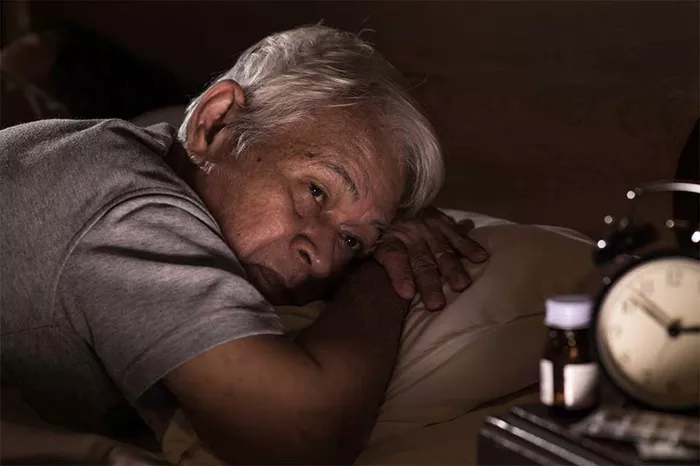A growing body of research is shedding light on the consequences of sleep problems in older adults, with a new study pointing to a troubling connection between insomnia, sleep medication use, and long-term disability. Conducted by researchers at Penn State College of Health and Human Development in collaboration with Taipei Medical University, the study found that both worsening insomnia symptoms and increased reliance on sleep aids significantly raise the risk of functional decline in adults over 65.
Published in the journal SLEEP, the study analyzed five years of data from 6,722 participants in the National Health and Aging Trends Study (NHATS), a large-scale, nationally representative sample of Medicare beneficiaries. Researchers evaluated more than 22,000 observations gathered between 2011 and 2015 to explore the long-term impact of sleep disturbances and medication use on physical capability.
Each year an individual reported a rise in insomnia symptoms, their risk of becoming disabled in daily activities increased by 20%. A similar risk was associated with higher levels of sleep medication use. Notably, individuals who both experienced insomnia and regularly used sleep medication were the most vulnerable to developing disabilities that impacted self-care and mobility.
“When we evaluated the relationships between disability, insomnia and sleep medication use, we found that as older people used more sleep medication or experienced more insomnia symptoms, they moved more rapidly towards greater disability,” said Dr. Orfeu Buxton, co-author of the study and the Elizabeth Fenton Susman Professor of Biobehavioral Health at Penn State.
Disability in the study was assessed using a validated annual questionnaire that measured participants’ ability to complete daily activities such as dressing, bathing, eating, using the toilet, getting out of bed, and moving indoors or outdoors. Researchers assigned numerical scores to these abilities: “fully able” (1 point), “vulnerable” (2 points), and “assistance needed” (4 points). A change of two points or more over time indicated a clinically significant decline in functioning.
Similarly, insomnia symptoms and sleep medication use were rated on a five-point scale ranging from “never” to “every night.” Data showed that for each level of increase in insomnia symptom frequency, the following year’s disability score rose by an average of 0.2 points. Sleep medication use showed a comparable pattern, with each level of increased frequency linked to a 0.19-point rise in disability score.
“These results indicate that both insomnia and sleep medication use may be contributing to disability,” said lead author Dr. Tuo-Yu “Tim” Chen, assistant professor in the global health and health security program at Taipei Medical University.
As an example, the study suggested that an individual who gradually increased their use of sleep medication from “never” to “every night” over five years would likely experience a clinically significant disability. Though individual outcomes vary, the findings underscore a broader trend: chronic sleep disturbances and frequent sleep aid use are strong predictors of future disability in older adults.
According to a previous study by the same research group, sleep medications also increase fall risk among older adults—a likely contributor to the link between such medications and physical decline.
“Many studies have demonstrated the physical, mental, and emotional harm that insomnia can cause,” the researchers said. “The connection between sleep disturbance and disability confirmed our hypothesis.”
Dr. Soomi Lee, co-author and associate professor of human development and family studies at Penn State, emphasized the importance of addressing sleep issues in aging populations.
“Insomnia can decrease a person’s quality of life both directly and indirectly,” Lee said. “Any older adult who experiences insomnia or uses sleep medication should talk to their physician. This can help ensure drug interactions aren’t worsening sleep problems and lead to safer, more effective treatment.”
One such treatment is cognitive behavioral therapy (CBT) for insomnia, which helps individuals recognize and change unhelpful thought and behavior patterns around sleep. Unlike medication, CBT offers a long-term solution without the risk of dependency or increased physical vulnerability.
“Many older adults think sleep disruptions are a natural part of aging, but they are a real problem that must be addressed,” Lee added. “And that problem is unlikely to improve unless people talk to their doctors. There are not enough sleep clinics, especially in rural areas, so older people may need to advocate for themselves to get proper treatment.”
The findings make clear that insomnia is far more than a nighttime nuisance—it’s a serious health issue that can accelerate physical decline. With America’s population rapidly aging, the researchers urge increased awareness and better access to safe, effective sleep treatments for older adults.
Related topics:
Cold Sensitivity and Leg Heaviness Linked to Varicose Veins
Early Antibiotic Use Linked to Long-Term Health Risks in Children
Brisk Walking Linked to Lower Risk of Heart Rhythm Disorders, Study Finds


